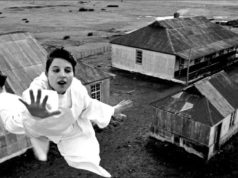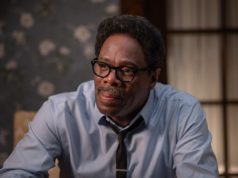One of Oklahoma’s greatest gifts to the moviegoing world is dead. Yesterday, director Blake Edwards passed away at the age of 88. That name might not mean much to you if you’re under a certain age. That’s what tends to happen to movie directors who are almost 30 years removed from their best work. Edwards had an up-and-down career, but at his best he was one of the all-time comedy greats.
He was best known for directing The Pink Panther and its sequels, smash hits that made stars out of both Edwards and Peter Sellers. (Edwards surely deserves recognition just for voluntarily working so often with Sellers, a great comic actor and a deeply unpleasant man by all accounts.) His career cratered in the early 1970s, shortly after his marriage to Julie Andrews and the flop of Darling Lili, his movie starring her. Edwards also had some demons; the Times obituary I linked to above contains a terribly funny story about the director trying to kill himself and being prevented by a farcical chain of events straight out of one his own films. Yet he enjoyed a late resurgence with the success of his marital-discord comedy 10, which turned Dudley Moore into an unlikely star and made Bo Derek fantasy material for a whole generation of straight men. His best movies use timing, framing, and composition expertly to maximize each laugh.
In many ways, Edwards was a product of his time. You can see more than just casual racism in the Japanese caricature played by Mickey Rooney in Breakfast at Tiffany’s and the Indian caricature played by Sellers at the center of Edwards’ (still quite accomplished) 1968 comedy The Party.
However, you can see him being far ahead of his time in his last great film, the 1982 comedy Victor/Victoria, which stars Andrews as a starving singer in 1920s Paris who finds stardom after a gay entertainer who’s also down on his luck (Robert Preston) encourages her to perform at Paris’ gay clubs by posing as a male drag queen. The film was made at the height of the AIDS epidemic, yet it doesn’t treat homosexuality as a tragic condition. The gayness is simply another element in the farce, as an American mob boss (James Garner) falls in love with “Victoria” but then ends up questioning his own sexuality after she’s revealed to be “Victor.” Of course, much of the charm came from Preston, giving what turned out to be his last performance and playing this gay best friend role with what Pauline Kael described as “unholy glee.” Still, Edwards’ matter-of-fact treatment of gayness made the film unique in its time, and only now are movies in general coming round to doing that.
You’d do well to get hold of some of his films on DVD, but if you’d rather see his stuff right now, this obituary in the Guardian has some great clips. When Edwards was given an honorary Oscar six years ago, he took part in one last brilliant sight gag. (It takes place around the 1:30 mark of this clip.) He was a peerless farceur, and the world never has enough of those.












Edwards never did get gay humor right, though he kept trying and failing. From the character Irving in Breakfast at Tiffany’s, to the execrable Victor, Victoria, he was like most straight directors when dealing with the subject. No gay person can watch Victor, Victoria without cringing. It is patronizing.
In general, his comedy was overbroad.